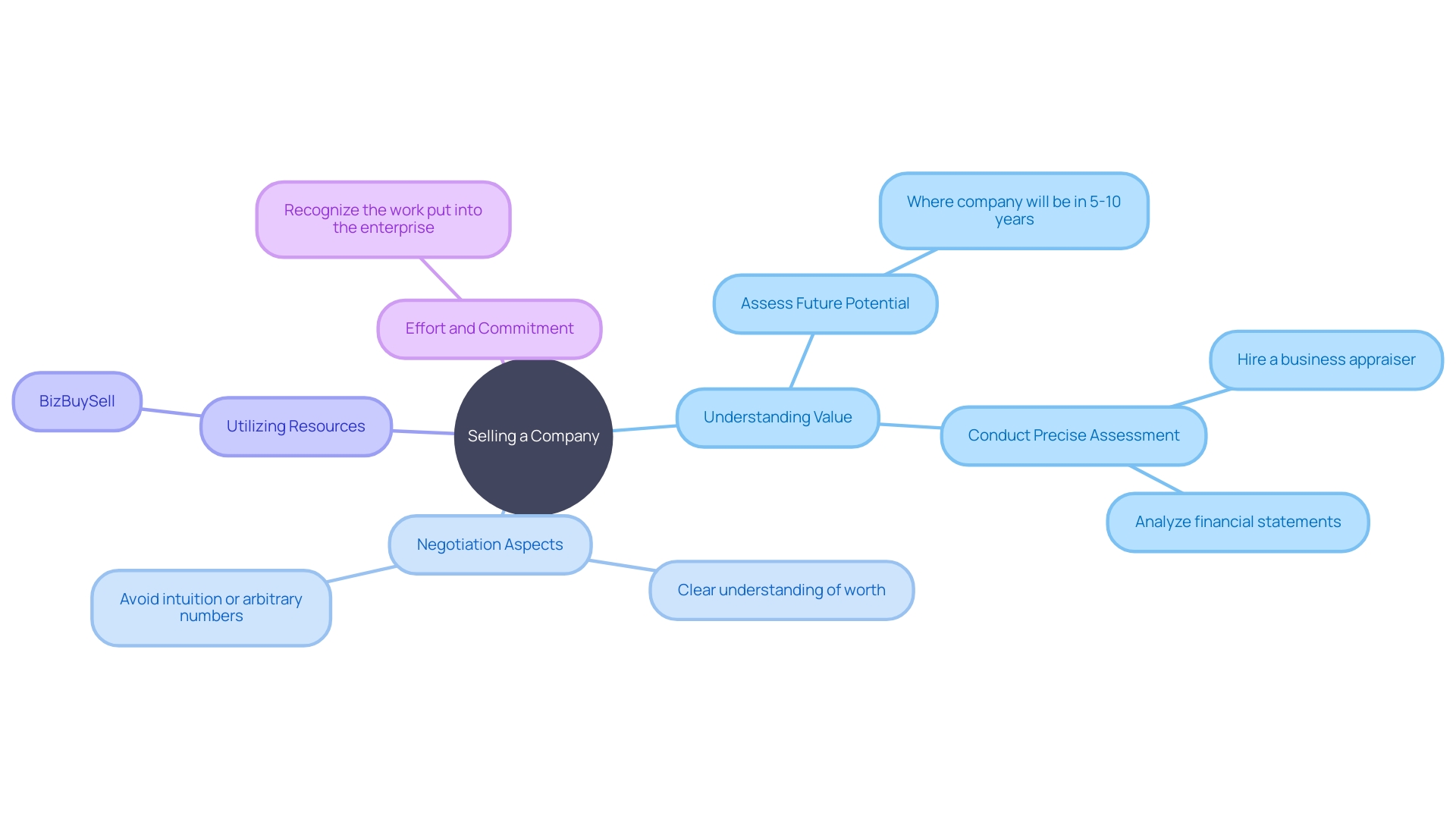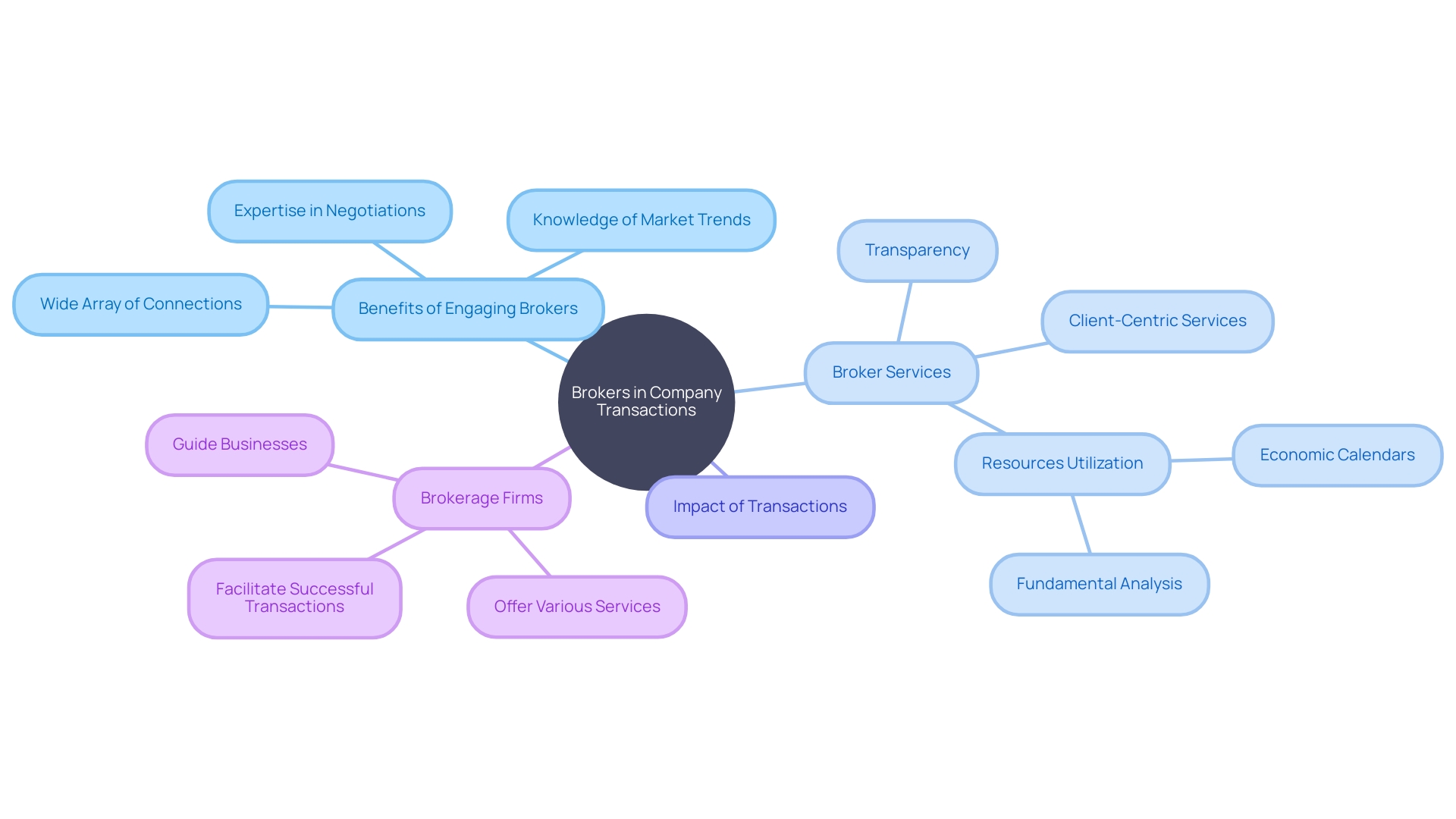Introduction
Thinking about selling your business? Before you dive into this step in your journey, as a business owner. It's important to grasp the steps and factors that play into the process. From assessing the worth of your business to connecting with buyers and hashing out a deal. Each phase demands planning and thoughtful decision making.
In this piece we'll walk you through the steps of selling a business while sharing tips from industry experts, for both experienced entrepreneurs and newcomers to the world of business sales alike. This detailed guide will give you the information and resources to effectively navigate the intricacies of selling your business with confidence. Lets get started on this journey into the realm of business sales together !
Preparing to Sell a Business
To maximize the profitability of your enterprise and attract buyers successfully it is crucial to start by conducting a thorough assessment of its worth. By seeking the guidance of a valuation specialist you will receive an examination of your financial documents assets and customer demographics in comparison to the latest industry developments. This process will help determine a market valuation, for your company. This functions as a point of reference during conversations and also aids in safeguarding against two typical risks; undervaluing the worth of your company resulting in a transaction, below its true value and overestimating it which may deter prospective purchasers.
Taking this information into account will assist you in strategizing for the future by contemplating where your enterprise may be heading in the next decade. This perspective can guide your choice to sell in a way that matches your strategic objectives for the long term. Also important is to think about how selling will affect your taxes and life post career to make the transition as seamless, as possible.
Negotiations often depend on planning and tactics for success. To enhance your negotiation skills when selling your company, it's advantageous to learn from professionals like Chris Voss who possess a profound comprehension of negotiation acquired from demanding situations. Obtaining an overview of market trends and customer preferences is essential in showcasing your enterprise in an attractive manner, to potential buyers in the process maximizing the result of your sale.
In the end goal of selling something for a good price, in the long run requires careful planning and smart choices to secure the best possible outcome.

Deciding to Sell and Creating an Exit Strategy
To effectively transition when considering selling your company it's important to recognize its value and develop a plan for moving forward successfully. Stora Ensos transformation from being a paper producer, to a materials pioneer underscores the significance of adjusting to changing market conditions and looking ahead. Pursuing a strategy involves assessing your enterprise extensively by considering finances resources, clientele and sector trends to determine an equitable market price. It's crucial to have a thought out exit plan that matches your goals. Whether you're planning for retirement or aiming to capitalize on a market chance. Not being prepared can lead to undervaluing your company or overlooking the opportunity. By setting goals and identifying the crucial elements that generate value in your industry, you can present your enterprise in an attractive manner to potential buyers or investors, with strategic interests. This secures a legacy that mirrors your dedication and effort.
Determining the Sale Price and Preparing the Business
Determining the selling price plays a crucial part in the process of selling your enterprise with success and efficiency. It entails more than selecting a number that appears sensible – it demands a comprehensive evaluation of your company's financial condition and possessions (both concrete and abstract) in addition to its general market position. Before you even think about setting a price for your enterprise. Whether, through the sale of stocks or properties. It's crucial to determine which option aligns best with your circumstances. Selling shares in a company implies transferring ownership stakes. Is commonly seen with C corporations and S corporations. In contrast liquidation deals, with selling off the assets and investments of the company.
The decision is greatly influenced by the profits known as capital gains which result from selling something off like property or investments and take into account details such as the investment amount and the final selling price along with expenses like equipment depreciation or costs, for improvements made over time. For instance; If a company was purchased initially for $200K and had $100K spent in upgrades before being sold for $350K the gain would be calculated at $50K. These gains are crucial as they influence your tax responsibilities based upon varying rates applied to long term capital gains.
Stephanie Wells from Formidable Forms and other experts emphasize the significance of establishing the worth of your company before engaging in negotiations rather than depending solely on speculation to prevent underestimating or overestimating your business—both of which could deter prospective buyers. Hiring an appraiser to evaluate your company by examining financial records and resources, while also taking into account the customer base and industry trends, can give you an accurate market estimation. This precise evaluation serves as a foundation, for negotiations and enables you to secure a deal that truly reflects the worth of your efforts.
When contemplating the potential transaction of your company, it is crucial to also consider its future trajectory. As stated by Abhijeet Kaldate from Astra WordPress Theme, it is advisable to pause and reflect on the positioning of your enterprise in the next five or ten years. Even though the current proposition may appear enticing, understanding its potential worth in the future can provide you with a more transparent perspective on whether or not to move forward.
To precisely evaluate the worth of a company's assets, various elements beyond the initial buying cost are taken into account; this includes supplementary expenditures such as establishment costs and personnel training, which play a role in augmenting the overall significance of the assets during appraisals and when developing strategies for a potential sales opportunity. This guarantees a profitable outcome and maximizes financial benefits while establishing a strong groundwork for future entrepreneurial pursuits.
Finding and Evaluating Buyers
Understanding the complexities of selling your enterprise requires discovering a purchaser who genuinely recognizes the worth your organization possesses. It's not about the monetary aspect but also understanding where your enterprise is headed in the long run is crucial to making a wise decision when it comes to selling your company. Industry professionals, like Abhijeet Kaldate, emphasize the significance of assessing your organization's future potential over the next decade before deciding to sell. By adopting a position, such as this, you can avoid undervaluing your enterprise by solely fixating on an alluring proposition without considering its genuine worth.
One essential aspect of this process involves conducting an precise assessment of the situation at hand. Stephanie Wells recommends steering of making assumptions or superficial assessments. Than depending on guesswork or superficial evaluations it is advisable to consult with an experienced evaluator who can thoroughly examine your financial documents evaluate your assets and customer base and compare your company to others, in the industry to determine its true market value.
Having a informed view is crucial as emphasized by Chris Voss who is known for his expertise in negotiations as an international kidnapping negotiator for the FBI. Voss offers a perspective on negotiating deals given his background. His understanding of talks at high stakes highlights the significance of being ready and knowledgeable about all aspects of the deal such, as post closing employment and transaction terms.
BizBuySell is the top marketplace for enterprises that offers a vast selection in various sectors and connects sellers with interested buyers effectively. They also provide valuable resources like the BizBuySell Guide to Purchasing a Small Business to help you prepare for the selling process.
Selling your company is a milestone in your entrepreneurial journey—it's not just about the deal but also, about recognizing all the effort and commitment you've put in over time! To maximize this opportunity and position yourself for the next phase in your career path, it's crucial to thoroughly understand the significance of your enterprise and its alignment with the wider market environment.

Understanding Buyer Types and Their Needs
When entering the world of purchasing or selling a business venture it's important to understand that every potential buyer has their reasons and requirements that they bring to the table. In order to ensure a seamless trasaction it's key to recognize ad comprehend the different types of buyers involved. These may include investors looking for opportunities to expand their investment portfolio as well as strategic buyers, like companies seeking synergies through acquisitions. Furthermore private equity companies frequently join the competition with resources and a distinct perspective, on assessing value and potential for growth.
Crafting your sales presentation to align with the preferences of these different types of buyers is crucial, for success—not just a suggestion but a vital strategic move. To tailor your pitch effectively involves delving into the factors that influence each buyers choices; whether its aiming for business growth opportunities or financial gains or expanding market presence. For example; personal investors might value the chance to be actively engaged and make changes while private equity companies may prioritize creating lasting value and scalability in the long run.
To successfully navigate through these waters requires putting a group of experienced individuals like lawyers and accountants or experts, in mergers and acquisitions; this is usually the most effective approach to take. These professionals offer expertise and experience that can help steer clear of typical challenges and simplify the process significantly. Their contribution can make a difference when dealing with the intricate negotiations procedures and legal aspects involved in these kinds of deals.
In the end grasping the viewpoint of the buyer can make all the difference. It involves putting yourself in their shoes and matching your companys assets with what they're looking for in an investment. The success of transactions relies heavily on this match. Having a deep understanding of a buyers perspective increases the chances of striking a deal that is advantageous for everyone involved paving the way for a successful partnership and laying a strong groundwork, for the company's future.
Using Brokers and Advisors to Facilitate Transactions
Initiating the procedure of acquiring or disposing of a company involves a sequence of vital measures that necessitate precision and specialized expertise to thrive in the endeavor at hand. Engaging the support of brokers and consultants can significantly impact this endeavor for the better. These seasoned experts not have a wide array of connections to link sellers with suitable buyers but also offer invaluable expertise in handling negotiations and overseeing the complex documentation required.
Having a demonstrated track record of achievement is an indication of a brokers skills and expertise because each successful deal enhances their credibility and validates their perspective on the significance of transactions. By partnering with brokers who have a track record of transactions you can benefit from their insights on current market trends and gain a competitive advantage. Furthermore real life examples like the process of finding suitable Akiya properties for clients, in Chiba Prefecture showcase the dedication and thoroughness that brokers put into fulfilling clients’ unique requirements.
Brokers don't just look into an array of choices but also take a thorough approach to keep you well informed throughout the process – akin to the transparency and client centric services promoted by platforms such as Service Pocket Option. According to professionals in the field partnering with a broker who's clear, about their methods and prioritizes your interests can greatly streamline the trading and investment journey.
Considering the impact of these transactions is also important and using resources such, as economic calendars and fundamental analysis can assist brokers in explaining the markets technical indicators and theories for predicting future prices to support your decision making process.
In the changing world of finance today with brokerage firms providing a range of services at different prices the knowledge and skills of a broker can be crucial. Whether its about improving the worth of a company managing tax considerations or preparing for life after a transaction a brokers profound comprehension and forward thinking approach can lead to a gratifying transition, for businesses.

Valuation Techniques for Businesses
When preparing to sell your company, evaluating its worth is essential. The assessment process, known as business appraisal, utilizes techniques to establish a reasonable selling price that would interest prospective purchasers. One approach is the Berkus Method, developed by investor Dave Berkus in the 1990s, which is especially suitable for early-stage startups and assigns a valuation to the vital elements of a budding company. This method demonstrates a scorecard approach in which every crucial element of a budding enterprise is evaluated to establish its worth.
In the realm of enterprises recognized for their innovation and novel concepts, assessing worth can be challenging due to the scarcity of past financial data and the unpredictable route to future achievements. Evaluating the worth of a startup is vital not only for investors who wish to comprehend potential profits but also for company insiders, for strategizing and distributing resources wisely. From the eight methods utilized to assess worth, such as the Berkus Method and the Book Value Method, it's crucial to select the one that suits your company's present stage and distinctive characteristics the most.
To make sure you're not underestimating your company or deterring potential buyers with inflated prices when selling it off and preparing to step down as an owner, it's essential to obtain a thorough and precise evaluation conducted by a skilled expert appraiser who can meticulously analyze financial records and assets, as well as customer data and industry trends, in order to ascertain the actual market worth of your enterprise.
Considering the financial landscapes effect on small enterprises, it's important to mention that the IRS has confirmed steady interest rates for the upcoming quarter. A crucial factor in financial strategizing and tax responsibilities awareness for entrepreneurs. Considering a potential outcome of sales success is crucial when being aware of the climate and your company's significance within this framework. Considering Stephanie Wells insights at Formidable Forms; envisioning where your company could place itself in the next five to ten years can be crucial, in evaluating its real worth and directing your decision on whether to pursue a sale.
Ultimately achieving a valuation isn't merely about crunching numbers—it involves grasping the market dynamics knowing your target audience and recognizing the distinctive worth your company offers. It's a strategic move that plays a vital role, in steering the course of your commercial transactions.
Income-Based Valuation and Asset-Based Valuation
It's really crucial to accurately determine the worth of a company when you're looking to make a purchase or sell it off. There are two ways to calculate this worth; by examining the income it generates or based on its assets. The income-based approach focuses on the profits and cash flow of the company over time. This method takes into consideration how the company is performing financially and includes factors such as Earnings Before Interest Taxes Depreciation and Amortization (EBITDA) as well as Free Cash Flow (FCF). It is also adjusted to account for one-time events or expenses that are not indicative of the regular company operations in order to precisely evaluate its potential profitability.
On the other hand, valuation based on the intangible elements of a company focuses on the non-physical resources; these include tangible items such as real estate and machinery as well as intangible factors like brand names and customer connections. This method is especially valuable, in evaluating the intrinsic worth of resources in the event the company must be liquidated. When considering a deal or transaction it's crucial to grasp the intricacies of both valuation approaches. Each category of transaction. Whether it involves purchasing shares of a company in a stock transaction or transferring properties in a transfer. Comes with unique tax implications that can impact how capital gains are calculated.
During an asset sale process like this one mentioned here as an example; every individual asset goes through an evaluation that takes into account more than just the initial buying cost; additional expenses such as installation and training are also factored in. This comprehensive appraisal approach aims to guarantee an evaluation of the overall worth of the enterprise in question – ultimately leading to a fair and appealing selling price, for prospective buyers seeking to make a purchase decision based on well-informed considerations.
The Role of Accountants and Auditors in Valuation
Valuation in business is an area that goes beyond just the numbers found in financial statements. Accountants and auditors contribute to this field by examining historical data and also by forecasting the future worth of a company. They particularly concentrate on elements such as intellectual property and brand recognition when evaluating the value of a company. As we've noticed with the success of tech giants the worth of a company now heavily depends on factors such, as brand power and market opportunities.
Given the importance of these holdings, the evaluation process requires a forward-thinking approach that combines principles and predictions instead of relying solely on traditional rule-based accounting methods. The challenge lies in integrating the assessment of intangibles into financial evaluations, which can greatly alter how a company's worth is perceived. As company environments advance and intangible assets become more crucial accountants must manage the challenges of valuation with an approach and a thorough understanding of a company's strategic possibilities.
Furthermore the Quality of Earnings ( QOE ) report has evolved into an instrument in this field delivering a detailed perspective on a company' s financial condition by incorporating essential adjustments for one time occurrences and other financial intricacies presenting a more transparent view of business value. This proactive report holds value, during the preliminary due diligence process before a transaction empowering entrepreneurs with a detailed and accurate portrayal of their company's true financial position surpassing what traditional audits can reveal.
Accountants and auditors play a role beyond numbers crunching. They serve as key partners in navigating the path, towards a successful sale or expansion opportunity. Their importance is heightened in today's changing economic landscape as they assist owners in understanding the true value of their enterprise and navigating through the intricacies of the current market conditions.
Negotiating a Deal
Acquiring the art of negotiation is essential for individuals involved in transactions such as purchasing and selling companies. Experts with decades of experience like Ami Kassar emphasize the significance of self control as an element in successful negotiations. It's not about the financial results that can lead to win win or other outcomes but also, about managing your actions and composure during the negotiation process.
To ensure a successful deal is finalized smoothly. Effectively requires a focused approach while managing emotions and being open, to revisiting any biased assumptions that could affect decision making clarity. Attributes that experienced individuals with expertise in time management associate with adept time management skills.
Furthermore acknowledging the viewpoint and concerns of the individual across from you is equally crucial as the figures at play. Selling a company isn't about transferring ownership but establishing a collaborative relationship that evolves throughout a period of transition. Whether the deal is worth $3 million or $30 million the intricate nature of the bargaining process requires time investment, mutual compromises and, in depth conversations.
By implementing these approaches, in negotiations participants can position themselves for success striving for a result that benefits everyone involved.
Issuing a Letter of Intent and Due Diligence
When someone approaches you with an offer to purchase your company assets or shares of a company you've built from the ground up over the years of work and dedication. It's essential to kick off the negotiations by drafting a letter of intent (LOI). This preliminary document acts as a roadmap, for the transaction by laying out key terms and conditions upfront before diving into the nitty gritty details of the deal itself. The Letter of Intent (LoL) goes beyond a customary procedure. It plays a vital role that demands thorough examination to guarantee that the conditions mirror your anticipations and safeguard your concerns.
Think about Sandy and Jim from Arizona who were close, to renting out their land for a farm initiative after receiving an enticing Letter of Intent (LoL). Thankfully they decided to get a perspective and realized the deal was not as good as it seemed at first glance This highlights how crucial it is to thoroughly examine not only the financial aspect of the buyer but also understand the consequences of the LOl itself.
During the diligence process, there is a comprehensive evaluation of all aspects of the potential deal, including a careful review of financial statements, customer data, and an analysis of how well your company aligns with the market and the competitive advantage it possesses. This detailed preparation provides you with information to make informed decisions and also helps anticipate the queries and worries of potential investors or buyers.
GrowthPoints insights emphasize a three step strategy that kicks off with the Data Prep or Diligence Preparation phase which stresses the importance of organizing and presenting your company's financial and strategic information to demonstrate its strengths and establish trust and transparency with potential buyers effectively.
Abhijeet Kaldate of Astra WordPress Theme suggests taking into account your company's direction before thinking about selling it out. Stephanie Wells of Formidable Forms supports this idea by stressing the importance of being aware and ready for transitions. Many entrepreneurs find themselves wanting to sell their ventures due to a desire, for a lifestyle or seeking new challenges.
Ultimately the Letter of Intent (LOL) marks the start of the journey; thorough examination and comprehension of each clause, alongside a forward thinking evaluation of your company's possibilities are what will steer you towards a fruitful and thriving deal.
Drafting a Purchase Agreement and Closing the Deal
Working together with professionals to design a comprehensive sales agreement plays an important role in the process of successfully transferring ownership of your company. This contract should encompass all aspects of the transaction to ensure it fulfills the requirements and expectations of both the seller and buyer. During the creation phase of the agreement, referring to an analysis of your company's finances, customer information, and market position will establish a solid foundation for the contract. Completed transactions often arise from thorough preparation, such as the Data Prep phase outlined by GrowthPoint, in which companies are prepared for evaluation by potential investors. It's more than numbers – it's about sharing the narrative of your company's essence, in the market and strategic goals.
As you approach the end of the process and complete the transaction details before concluding the deal with the buyer transferring ownership rights to them, it's essential to conduct an evaluation of the company's income quality and financial well-being, similar to a Quality of Earnings evaluation, which can be extremely beneficial in ensuring that the financial agreements accurately reflect the organization's actual worth. Having all aspects carefully considered and aligned will allow you to confidently proceed with closing the transaction‚ handing over ownership to the purchaser while having peace of mind that you've secured the favorable outcome, for your life's efforts.

Legal and Financial Considerations
When you're leading a business deal and need to decide between a stock transaction or a property transfer. It's a decision point. In a stock transaction scenario. You're essentially transferring ownership by selling your companys shares which's common, in C corporations and S corporations due their setups. In a sale of property. You're transferring the valuable assets of the company like its physical property. Both choices come with tax implications and impact how capital gains are calculated.
Your gains from investment in a venture are like the rewards for your work. They reflect the profit made when selling your company for more than what you invested in it initially, along with any enhancements you've made over time. For instance; Imagine purchasing a company for $200K and investing a $100K to improve it before ultimately selling it for $350K. In this scenario you'd end up making a gain of $50K. Understanding the impact of factors, on your financial gains is crucial; this includes considering the depreciation of properties and the expenses related to capital upgrades that can also impact your tax liabilities.
The contrast between term and long term capital gains taxes is an extra factor that varies when dealing with stock and property transactions. This emphasizes the significance of financial planning and tax planning to maximize the end outcome of your transaction. Moreover in evaluating enterprise properties don't overlook to take into account all associated expenses, such as setup expenses and training fees to have a comprehension of your company's worth.
Being well informed and ready for the complexities of selling a company is essential, without question. It's a process that requires attention to detail and thoughtful planning. Regardless of your level of experience selling a company is a move that involves delving into your financial situation understanding the market and complying with legal requirements to facilitate a successful and lucrative transition.

Asset Purchase vs. Stock Purchase
When you're ready to transfer your ownership rights, deciding between selling the company's stocks or its possessions is an option, with significant financial implications involved. Choose a stock transfer if you want the buyer to acquire an ownership stake by purchasing your shares.. This option is often preferred in deals involving C and S corporations because of their structural traits. Providing a more straightforward procedure overall compared to the act of selling a company by transferring its tangible and intangible possessions, which include machinery and client databases, each of which holds value beyond a single financial year.
The distinction between these two sales approaches is significant because they impact the calculation and taxation of capital gains. As an illustration of the outcome when you sell your enterprise and generate income from it, the profit represents the difference between your initial investment and the final proceeds. If you initially invested $200,000 in the enterprise, along with an additional $100,000 for enhancements, and subsequently sold it for $350,000, your capital gain would be determined to be $50,000. Keeping in mind that factors such as the depreciation of equipment or upgrades to properties can affect the magnitude of the capital gain and thereby affect your tax obligations is vital.
Comprehending the regulations for short and long term capital gains is vital when dealing with stock and property transactions as they vary between the two types of investments. This understanding is crucial for determining the tax-saving strategy to selling your company since it can greatly affect your ultimate earnings. When evaluating company resources for a transaction it's important to take into account all associated expenditures apart from simply the acquisition cost. These may encompass expenses, for installation upgrades and employee training which all contribute worth to the property.
Considering the nature and significant financial implications involved in such matters it is recommended to consult with professionals, in both legal and financial fields. Their guidance can assist you in maneuvering through the details of the deal and selecting the beneficial course of action that aligns with your unique situation and objectives.

Tax Implications and Liability Considerations
It's crucial to choose between a stock transaction and a property transaction when you're selling your company. In a stock transfer scenario the buyer acquires the sellers shares and obtains ownership of the company, an approach for C corporations and S corporations. On the other hand, an asset transaction involves disposing of the company's tangible assets such as property and equipment. The decision, between these options impacts how capital gains are determined and taxed.
When you sell your enterprise for more than what you invested in it and make a profit from it—thats called a capital gain. On the other hand, there is a capital loss when the amount from the transaction is lower than your initial investment. For example; If you invested $200k initially and spent $100k for improvements; then sold the company for $350k—your capital gain would be $50k.
The tax consequences of profits can differ significantly depending on whether the deal is structured as a stock transaction or a transfer of property resulting in different application of short term and long term capital gains rates highlighting the significance of comprehending the complexities of such transactions to maximize post tax profits from your transaction.
When evaluating the worth of assets for a transaction, it is essential to consider all expenses beyond the initial purchase price. This includes taking into account the costs associated with the establishment and training of staff members on operating equipment, as these factors have a significant impact on the overall value of the assets.
Tax professionals and attorneys contribute to this journey to comply with tax regulations and minimize potential risks involved in the process of selling a company. It's a complex field to navigate. With appropriate direction, you can efficiently and proficiently oversee the process of selling your company.
Completing the Sale
When its time to hand over the reins of your organization to someone else, it's crucial to approach the transfer, with care and thoughtful consideration. Think about where your company's headed in the long term and envision its position ten years down the road. While you may receive tempting offers, ultimately it's the worth of your enterprise, determined through a thorough evaluation process, that truly determines its significance.
A crucial component of this procedure entails an evaluation process. An error that many people commit is relying on approximations or arbitrary figures which can result in either underestimating or overestimating the worth of your business; both situations may demotivate potential buyers. An experienced business appraiser can meticulously analyze your records, capital holdings, customer base, and market conditions to ascertain the precise market price of your business. This assists you in refraining from undervaluing yourself or demanding an excessive sum.
When considering how to organize the process of selling and maximizing profits after taxes are factored in, it is important to carefully decide between a stock transaction and an asset transaction, as each choice has distinct tax implications that can greatly impact the final result. Ensure that your decision aligns with your financial objectives and tax planning strategies.
As you progress through this path of exploration and learning from market trends could be beneficial to your journey ahead! For example; the recent purchase of Motel 6 and Studio 6 by Oyo for $525 million. Verizon huge acquisition of Frontier Communications, for $20 billion demonstrate strategic moves aimed at long term expansion and value enhancement.
When you're selling your enterprise legacy the clever way is to aim not for a sale but, for a deal that truly represents its worth and potential.
Finalizing Legal Documents and Transferring Ownership
When it comes to buying or selling a company seamlessly and efficiently finalizing the transaction goes beyond a handshake agreement—it involves careful attention to legal paperwork to ensure every detail is in place and accounted for correctly. By leveraging digital tools like e signatures in the agreement process can significantly simplify the transaction process overall while fostering transparent and efficient collaboration, between legal professionals and clients. For example an electronic signature acts as a sign of agreement much like a regular handwritten signature but with the ease of being used digitally.
When it involves changing ownership of something like a business or product line it's not solely about the legal paperwork for buying and selling. You need to consider assets and intellectual property rights such as trademarks. Which can be anything from distinct colors to specific bottle designs like the famous Coca Cola contour. Trademarks whether officially registered or not are vital, for setting apart a company's products or services in the marketplace. It is crucial to make sure that these important resources are transferred correctly and that any relevant legal safeguards. Like the ones offered by the U.S Patent and Trademark Office (USPTO). Stay whole, after the transaction.
In addition to that point about transitioning ownership is the need to stay updated on regulatory requirements too. Recent significant legal events such as Celsius Networks evolution during its bankruptcy process underscore the necessity of addressing legal matters and collaborating on regulations. The establishment of Ionic Digital Inc. And its subsequent administration by Hut 8 Corp after Celsius reorganization showcases the attention to detail and strategic foresight necessary, for such transitions.
Success in transferring ownership ultimately depends on preparation and the utilization of specific tools and services to guarantee legal compliance and operational effectiveness while safeguarding the interests of all parties involved in the process. By adopting these methods and comprehending the legal intricacies involved in the process of ownership transference allows entrepreneurs to confidently manage the challenges of such transactions, with ease and ensure a smooth and legally compliant transition of ownership rights.
Post-Sale Considerations and Transition Planning
When you enter the stage following the sale of your enterprise it's important to ensure a smooth handover that keeps things running and relationships intact without a hitch. Ensuring a smooth transfer of customer connections is essential as they are what sustains the company's strength. Think about introducing the owners in a more personalized way to build trust and maintain consistency. Giving training to the new owners is equally important—they need to have all the details and resources necessary to effectively manage the company right from the beginning. It's also important to create a plan for employees to ensure the smooth running of operations and retention of internal knowledge within the company structure moving forward. At this point in the planning process it's not just about transferring ownership; it's, about guiding the company towards sustained success and expansion. Keep in mind that a successful transition reflects the lasting value of the business you've nurtured over time.

Conclusion
To sum up the process of selling a business effectively involves conducting an evaluation and planning with the assistance of experts, in the field. It is important to assess the market worth of your business by examining records and market trends comprehensively. Additionally One should take into account their goals, tax consequences and the requirements of prospective purchasers.
Connect with brokers and consultants well, as accountants and auditors to help with the selling process while making sure all legal and financial requirements are addressed properly Negotiate a detailed purchase agreement that satisfies the requirements of both sides.
Ensure that all legal paperwork is completed and ownership is transferred with precision paying attention to the details involved in the process. Ensure a transfer of customer relationships and offer comprehensive training to incoming owners to facilitate a successful transition of ownership.
In short selling a business involves a process that demands thorough preparation and expert advice. By evaluating the value of your business seeking assistance, from professionals and handling negotiations skillfully you can attain a result that mirrors the genuine value of your hard work.
Ready to sell your business? Get expert assistance and maximize your returns today!




